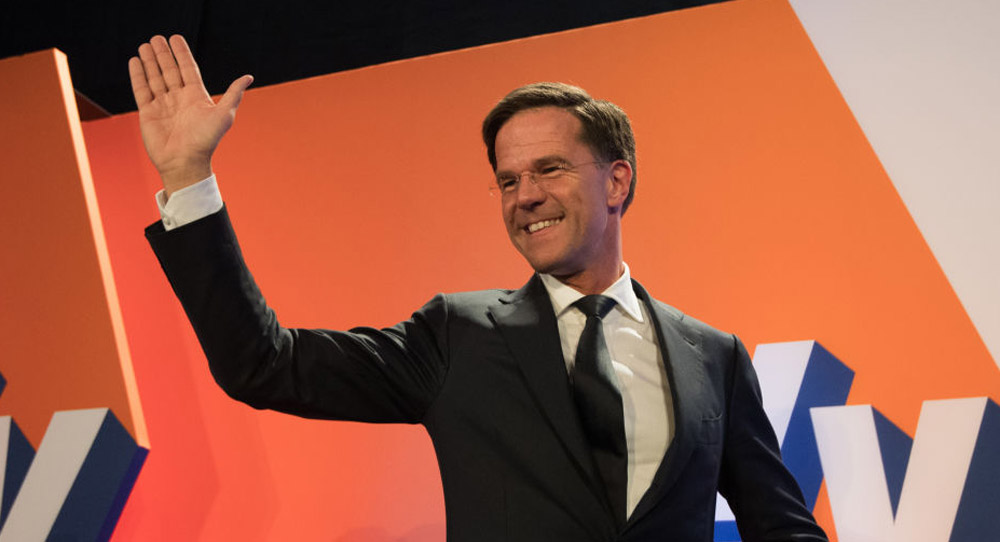After a campaign so often shamefully marked by anti-Islam, anti-Turkey, and anti-immigration rhetoric, the Dutch voted on March 15 to reelect Prime Minister Mark Rutte in an election result that has consequences for the rest of the EU.
Rutte’s center-right People’s Party for Freedom and Democracy (VVD), which, according to preliminary results, won 33 of the 150 parliamentary seats, looks set to form a coalition with other pro-EU parties. Together, they managed to see off the anti-immigration Party for Freedom (PVV) led by Geert Wilders. The PVV gained votes but not enough to make the impact Wilders had hoped for.
There was undisguised relief at the result, particularly from neighboring Germany. Chancellor Angela Merkel’s chief of staff, Peter Altmaier, tweeted: “The Netherlands, oh the Netherlands you are a champion! . . . Congratulations on this great result!” Over recent days, Altmaier, who speaks Dutch, had commented on the importance of the Dutch election. Berlin had no illusions about the consequences of the poll. Had the Netherlands swung decisively behind Wilders, it would have given a huge boost to other populist parties across Europe, particularly in France, which holds the first round of its presidential election in April.
The prospect of the French electing the leader of the far-right National Front, Marine Le Pen, as their president haunts Berlin. Indeed, the idea of a France under Le Pen quitting the eurozone or even holding a referendum to leave the EU could lead to a union in free fall. No wonder there was delight in Berlin at the outcome in the Netherlands. Merkel called Rutte to congratulate him.
As the election results poured in, Rutte said it was “an evening in which the Netherlands, after Brexit, after the American elections, said ‘stop’ to the wrong kind of populism.” It’s not clear what Rutte meant by the “wrong kind of populism.” But four things can be gleaned from his victory.
The first is that Rutte played the populist card. He had told immigrants to be normal (like the Dutch). “Those people who refuse to adapt, and criticize our values” should “act normally or leave,” Rutte wrote early in the campaign. He said he understood how people thought: “If you so fundamentally reject this country then I’d prefer it if you leave.”
His government also recently clashed with Turkey after banning Turkish ministers from campaigning in the Netherlands ahead of Turkey’s April 16 constitutional referendum. It’s hard to know whether his anti-Turkish stance helped the VVD. In any event, the party’s share of parliamentary seats was reduced from 41 in 2012 to 33, a result that reflected the growing fragmentation of Dutch politics.
The second aspect is the nature of the campaigns held by his prospective coalition partners, Democrats 66 (D66), the Christian Democratic Appeal (CDA), and GreenLeft, the last of which made big gains, up from four to fourteen parliamentary seats. These parties focused in large part on domestic issues and on the traditional Dutch values of openness and tolerance.
Third, these moderate parties did comparatively well because the Dutch were unwilling to trade certainty for unpredictability. A country that depends so much on exports, an open society, and an open economy was not prepared to go down the path of Wilders.
And finally, the Dutch endorsed Rutte’s austerity measures—not overwhelmingly, but enough to get him reelected. Since the measures were introduced in 2011, the Netherlands’ budget deficit has fallen from 4.3 percent of GDP to a forecast 0.5 percent in 2017. The economy, too, is growing.
There will be lots of horse-trading in the coming days and weeks as Rutte tries to put together a coalition, which this time is unlikely to include his previous junior partner, the Labor Party (PvdA). The party was almost decimated, winning only nine seats according to preliminary results, compared with 38 in 2012. The PvdA was punished for supporting the government’s tough austerity measures.
In the meantime, pro-EU parties across Europe now have a chance to capitalize on the Dutch results. There are grassroots movements organizing pro-EU rallies across the bloc. Maybe Britain’s decision to leave the EU and the election of U.S. President Donald Trump are beginning to move Europeans out of their comfort zone and a kind of indifference that populists have been able to exploit. The Dutch results just might be the beginning of this shift.






.jpg)